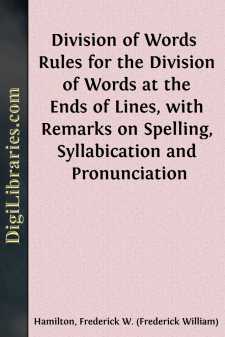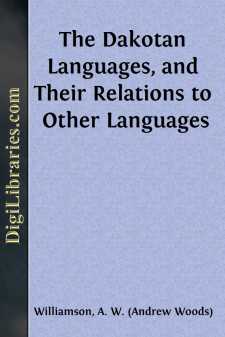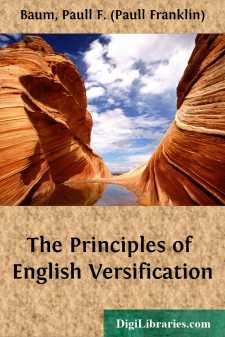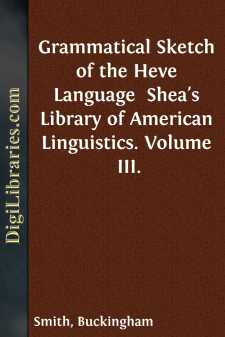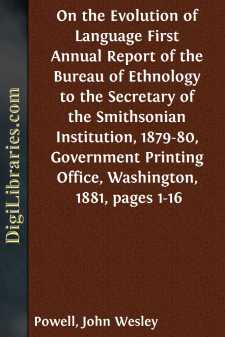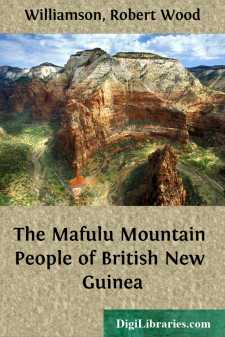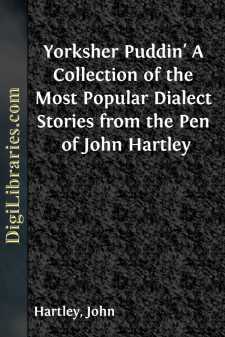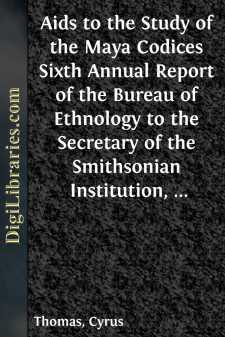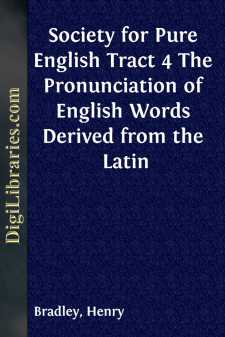Language Arts & Disciplines
- Alphabet 2
- Authorship 5
- Composition & Creative Writing 2
- Etymology 4
- General
- Grammar 18
- Journalism 3
- Phonetics & Phonics 1
- Public Speaking 1
- Readers 2
- Reading Skills 1
- Rhetoric 8
- Semantics 1
- Spelling 2
- Study & Teaching 3
- Translating & Interpreting 2
- Vocabulary 5
General Books
Sort by:
CHINA AND THE CHINESE THE CHINESE LANGUAGE If the Chinese people were to file one by one past a given point, the interesting procession would never come to an end. Before the last man of those living to-day had gone by, another and a new generation would have grown up, and so on for ever and ever. The importance, as a factor in the sum of human affairs, of this vast nation,—of its language, of its...
more...
SPELLING The idea that there is one right way to combine the letters representing a certain sound or group of sounds, that is a word, and that all other ways are wrong and little short of shameful is a comparatively new idea among us. The English speaking folk held down to a comparatively recent time that any group of letters which approximately represented the sound was amply sufficient as a symbol of...
more...
To the ethnologist and to the philologist the Dakotas and those speaking kindred languages are a very interesting people. There are four principal Dakota dialects, the Santee, Yankton, Assinniboin and Titon. The allied languages may be divided into three groups: I. a, Winnebago; b, Osage, Kaw, and 2 Quapaw; c, Iowa, Otoe and Missouri; d, Omaha and Ponka. II. Mandan. III. a, Minnetaree (Minitari) or...
more...
PREFACE Most of the older discussions of English versification labored under two difficulties: an undue adherence to the traditions of Greek and Latin prosody more or less perfectly understood, and an exaggerated formalism. But recently the interest and excitement (now happily abated) over free-verse have reopened the old questions and let in upon them not a little light. Even today, however, a great...
more...
by:
Buckingham Smith
PART I: ORTHOGRAPHY. It has been thought proper to use nineteen characters in the language, among which are not included f, j, k, w, x, y, nor l, although the sound of l is somewhat heard in the soft enunciation given by the Indian to the letter r. The k is sufficiently supplied in the syllabic sounds que and qui, where the u is silent, although gue and gui are each of two syllables. There has been a...
more...
I.—THE PROCESS BY COMBINATION. Two or more words may be united to form a new one, or to perform the office of a new one, and four methods or stages of combination may be noted. a. By juxtaposition, where the two words are placed together and yet remain as distinct words. This method is illustrated in Chinese, where the words in the combination when taken alone seldom give a clew to their meaning when...
more...
Introductory The appended to this volume is (with the exception of the red lines and red lettering upon it) a reproduction of a portion of the map relating to the explorations and surveys of Dr. Strong, Mr. Monckton and Captain Barton, which was published in theGeographical Journalfor September, 1908, and the use of which has been kindly permitted me by the Royal Geographical Society. I have eliminated...
more...
by:
John Hartley
Or the Cottage on the Hill. A Christmas Story. CHAPTER I. The last strain of the grand old Christmas hymn had just been warbled forth from the throats and hearts of a number of happy folks, who were seated around the blazing log one Christmas eve; and on the face of each one of that family circle the cheering light revealed the look of happiness; the young—happy in the present, and indulging in...
more...
by:
Cyrus Thomas
INTRODUCTION. The object of this paper is to present to students of American paleography a brief explanation of some discoveries, made in regard to certain Maya codices, which are not mentioned in my previous papers relating to these aboriginal manuscripts. It is apparent to every one who has carefully studied these manuscripts that any attempt to decipher them on the supposition that they contain true...
more...
by:
Henry Bradley
ON THE PRONUNCIATION OF ENGLISH WORDS DERIVED FROM LATIN [This paper may perhaps need a few words of introduction concerning the history of the pronunciation of Latin in England. The Latin taught by Pope Gregory's missionaries to their English converts at the beginning of the seventh century was a living language. Its pronunciation, in the mouths of educated people when they spoke carefully, was...
more...



